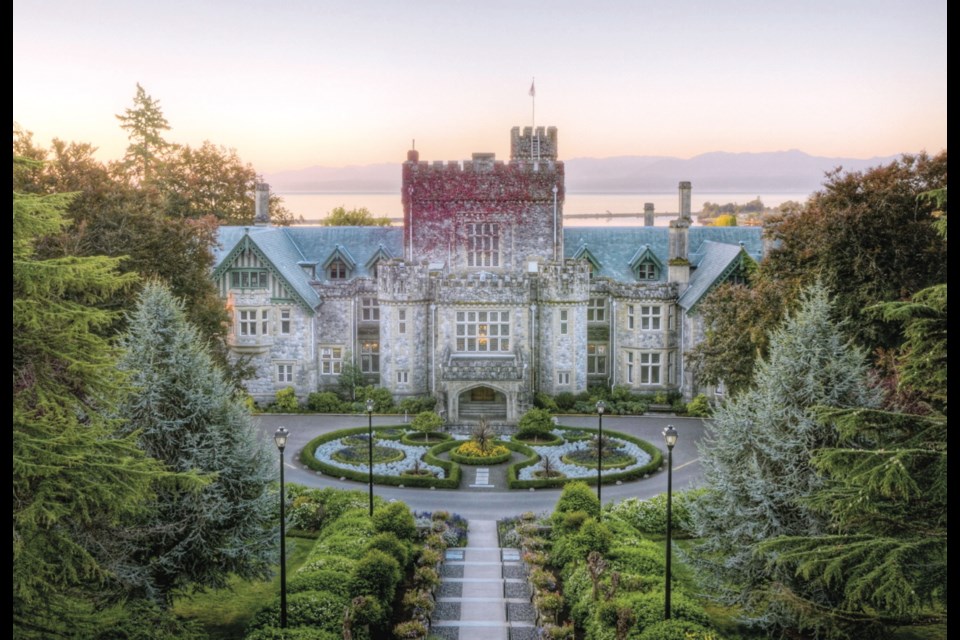As Royal Roads University celebrates its 25th birthday this year, it continues to count on its flexible structure to offer programs addressing global issues that seem to be arriving at an ever-increasing pace.
President Philip Steenkamp says of the university’s beginnings: “The amazing thing about it, in a sense, is that it anticipated the future.”
At the same time, many organizations are moving towards the blended learning model seen at Royal Roads, which allows students to learn at their own pace, on their own time and at their own location, he said.
When Royal Roads opened its doors in 1995, it created a new option for post-secondary students, joining the University of Victoria and Camosun College in the capital region.
Today the three institutions are working together on a proposal to establish a new post-secondary campus in the rapidly growing West Shore. A business plan focusing on undergraduate education has been finished and has gone to the province for a decision, Steenkamp said. The province vets proposals for degree programs.
“From Royal Roads’ perspective, this would take us fully into the undergraduate business, and we would be offering an entirely new and unique curriculum,” he said.
The new campus would offer what Steenkamp calls a “challenge-based” curriculum.
“Instead of having traditional faculties and departments and traditional courses, students would come in and work on particular challenges,” he said. “All their learning would be curated around particular challenges like climate, or poverty, or it might be a business challenge working with local businesses.”
In the past quarter of a century, new buildings have gone up on the spectacular waterfront Colwood property and construction is continuing. Historic Hatley Castle has dazzled us as a movie location for blockbusters such as Deadpool and the X-Men films.Thousands of students have graduated in a wide range of programs, many offered largely online.
“Everybody now is talking about the stuff we were talking about 25 years ago — the need really to focus on lifelong learning because the world is changing so rapidly,” Steenkamp said during an wide-ranging interview in which he examined the university’s past and its future.
“It’s no longer a world in which you get a degree, you leave, you get a career and you stay in that career and then you retire,” he said.
“You have to re-skill and up-skill given the incredible changes that we see in the economy and the incredible challenges we face as a society right now.”
Royal Roads programs are structured so that students can return in the future to update and upgrade skills and knowledge, with credits earned applying to more senior qualifications, he said.
A new strategic plan is being developed and will go to the board of directors in March, he said.
“The question for us now in our 25th year is what do we want to be when we turn 50 in another 25 years’ time,” Steenkamp said.
Issues to address include “tectonic changes in the workplace as a result of the digital transformation that’s occurring,” Steenkamp said. “With the rise of artificial intelligence, the gig economy, automation.”
Climate is on the agenda, as Royal Roads proposes a master’s degree in climate action leadership, which would be accompanied by ancillary programs for certificates and diplomas. That proposal is “garnering huge interest,” Steenkamp said. As with the plans for the new campus, the proposal is before the province.
Interconnected issues, such as the rise of populist governments, social upheaval and xenophobia are affecting the globe right now and highlighting the need for leadership. “From the beginning, we’ve put a lot of emphasis on leadership. So what does leadership look like in that kind of environment?” Steenkamp said.
Education around collaboration, teambuilding, and taking an inter-disciplinary approach are ways of examining the big challenges and trying to find solutions within the university’s programs, he said.
The current pace of change “makes the industrial revolution look like continental drift,” Steenkamp said.
“It’s so incredibly quick, and so we really have to ask ourselves, how do you constantly be in the mode of providing people with the skills they need to thrive in this rapidly changing economy?”
When it comes to tackling emerging issues, Royal Roads has a streamlined governance structure allowing it to respond with new courses in a matter of months, rather than taking a few years, he said. As well as the core faculty, many educators are practitioners of what they are teaching and are hired on contract.
Steenkamp anticipates all programming will be viewed through what he calls “lenses” relating to matters such as reconciliation with Indigenous people, climate change, impacts of digital technology and artificial intelligence, and ways to advance the United Nations sustainable development goals.
Esquimalt Nation and Royal Roads University signed a framework agreement last year outlining how they will work together throughout the Department of National Defence land-disposition process. The university signed a similar agreement with the Songhees Nation in 2018.
Steenkamp is also aiming to forge a stronger connection with the public.
Last year, he announced that entrance to the Hatley Park Gardens will be permanently free of charge, thus scrapping fees imposed in 2006. The garden with about 1,500 plants is a tourist attraction located between the castle and Esquimalt Lagoon and within 565-acre Hatley Park National Historic Site.
A new 400-seat educational auditorium, located inside a building once housing a swimming pool, is under construction and will be opening in October, he said.
Not only will it give the university the ability to stage large events on campus, but Steenkamp hopes it will be used by the broader community, as well.



